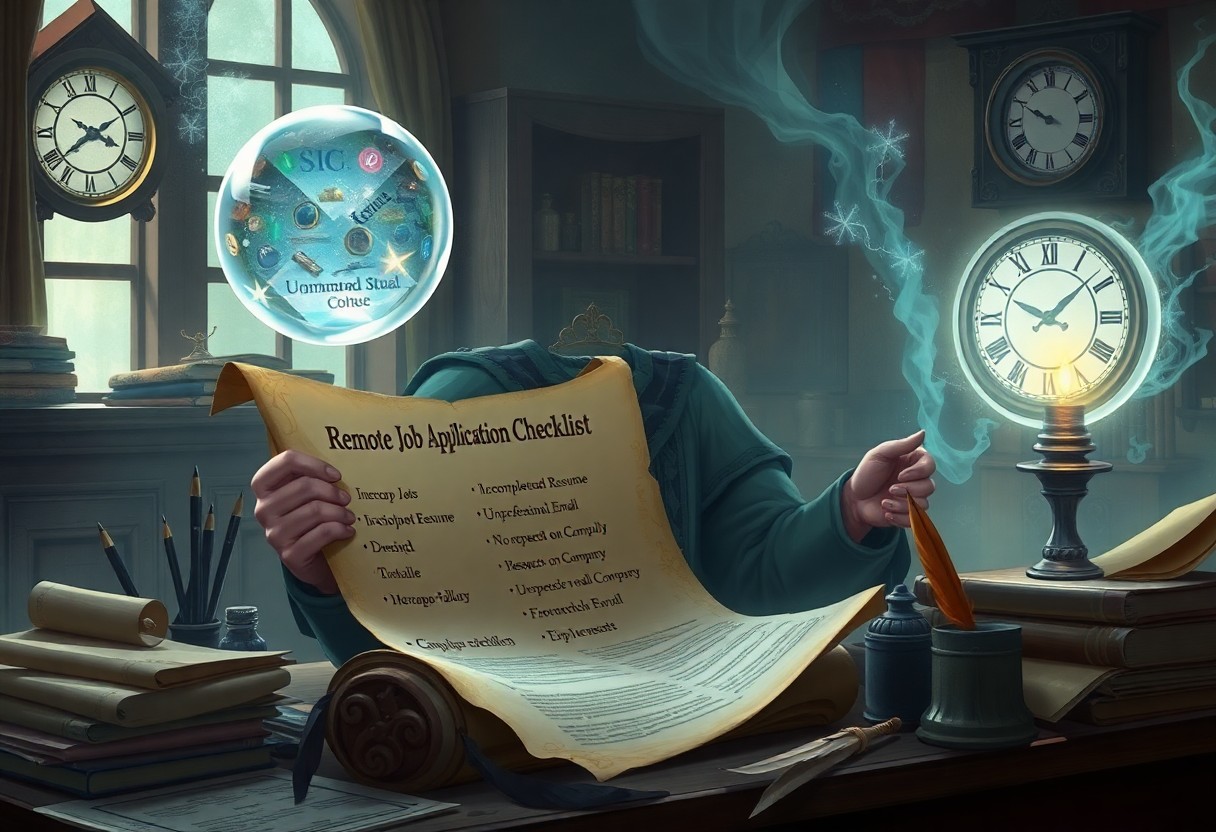You may think you know how to apply for jobs, but there are common pitfalls that can hinder your chances of landing a remote position. In my experience, failing to tailor your resume and cover letter can lead to immediate disqualification. Additionally, neglecting to showcase your remote work skills might leave potential employers unconvinced of your capabilities. I’ll guide you through key mistakes to avoid, empowering you to present your best self and improve your chances of success in the competitive remote job market.
Key Takeaways:
- Tailor your resume and cover letter to highlight relevant experience and skills for remote work.
- Ensure your online presence is professional, including social media profiles and LinkedIn.
- Prepare for video interviews by checking technology and practicing responses to common questions.
Understanding Remote Job Requirements
Each remote position comes with specific requirements that can differ significantly from traditional roles. I focus on thoroughly analyzing job descriptions for not only the required skills but also any preferred qualifications. This helps in identifying where I align and where I may need to enhance my expertise. Assessing the tools and technologies mentioned is important, as they often play a pivotal role in daily tasks and team collaboration.
Researching Company Culture
Diving into the company culture provides insights into whether a remote position is a good fit. I explore company websites, employee reviews, and social media profiles to grasp values and expectations. A solid understanding of culture helps me align my application and communication style with what the organization prioritizes, enhancing my chances of standing out in the hiring process.
Identifying Skills Relevant to Remote Work
Identifying key skills for remote work is important for a successful application. I focus on aspects like communication, self-motivation, and time management, as these are typically emphasized in remote job listings. Additionally, familiarity with virtual collaboration tools can be a significant advantage, letting me showcase my ability to adapt to the remote work environment efficiently.
Tools like Slack, Trello, or Zoom are often mentioned in job postings, signifying a need for proficiency. I evaluate my experience with these platforms and ensure I highlight it in my resume. Skills such as effective written communication, project management, and the ability to work independently under minimal supervision are assets in the remote job arena. To reinforce my profile, I consider obtaining certifications or taking courses related to remote work best practices, providing tangible evidence of my commitment and expertise to potential employers.
Tailoring Your Resume and Cover Letter
To stand out in your remote job applications, tailor your resume and cover letter to reflect the specific requirements of each position. I focus on incorporating relevant keywords from the job description, which can be vital in passing through Applicant Tracking Systems. Modifying your accomplishments and skills to align with what the employer is seeking ensures that I present myself as the best fit for the role.
Highlighting Relevant Experience
Showcasing your most relevant experience is key. I carefully select roles and projects in my history that directly demonstrate my ability to thrive in a remote environment. This includes pinpointing skills like effective communication, time management, and collaboration using digital tools, ensuring I communicate my potential to succeed in a virtual team.
Addressing Gaps and Challenges
When faced with employment gaps or challenges, I strategically address these in my application materials. Providing context, such as taking time for upskilling or personal projects during a gap, helps illustrate resilience and a proactive mindset. This not only mitigates concerns but also showcases my commitment to continuous growth.
Highlighting details around gaps or challenges is not about making excuses but rather showing how they have shaped my journey. For example, if I took time off for personal reasons, I emphasize the skills or knowledge I gained during that period, such as freelance projects or online courses completed. By converting potential red flags into strengths, I create a narrative of adaptability and determination that resonates with employers looking for candidates who can navigate obstacles effectively.
Preparing for a Remote Interview
Preparation can make or break your remote interview experience. Focus on enhancing your technical setup and environment to eliminate distractions and technical difficulties. For insights into avoiding common pitfalls, explore Remote Hiring Solutions: Avoid 9 Common Interview ….
Technical Setup and Environment
A reliable internet connection is non-negotiable for remote interviews. Ensure your webcam and microphone work properly, and test them before the interview. Consider your background—opt for a tidy, well-lit space that reflects professionalism. Background noise can be disruptive, so use headphones or choose a quiet room.
Practicing Common Remote Interview Questions
Reviewing common remote interview questions can greatly increase your confidence. Questions often revolve around communication skills, time management, and problem-solving ability. Tailor your answers to highlight experiences that demonstrate these skills effectively, focusing on results and positive outcomes.
Practicing common remote interview questions like “How do you stay organized while working independently?” or “What tools do you use for remote communication?” prepares you to articulate your responses clearly. Use the STAR method (Situation, Task, Action, Result) to frame your experiences. Practicing with a friend or in front of a mirror helps solidify your answers, boosting your delivery and ensuring that you convey competence and readiness for the remote work environment.
Following Up Post-Interview
Securing a remote position involves more than just nailing the interview; following up is equally pivotal. A well-timed follow-up can reinforce your interest and keep you fresh in the recruiter’s mind. Crafting a thoughtful message can demonstrate your professionalism and enthusiasm, making you stand out in a competitive pool.
Timing and Approaching Follow-ups
Sending a follow-up email within 24 to 48 hours post-interview strikes the right balance between enthusiasm and respect for their time. A concise, well-crafted email will affirm your interest in the role while avoiding the pitfall of seeming desperate or impatient. Tailor your message based on the interview’s tone and content for a personalized touch.
Expressing Gratitude Effectively
Conveying gratitude in your follow-up can significantly impact your candidacy. A simple “thank you” offers appreciation, but adding a specific detail from your conversation shows attentiveness and connection. Mentioning a shared insight or reiterating your enthusiasm for a project discussed can further strengthen your appeal to the hiring manager.
Expressing gratitude effectively means going beyond a standard thank-you. Personalizing your message by referencing a meaningful topic from your discussion helps solidify the relationship you’ve started. For instance, if the interviewer mentioned their commitment to a certain project, acknowledge it and briefly relate how your skills or experiences align with it. This tailored approach creates a lasting impression and keeps your candidacy top of mind, showing that you’re not just another applicant but a thoughtful, engaged potential team member.

Avoiding Red Flags in Job Listings
Job listings often hold significant insights about potential employers, making it crucial to spot red flags. The language used, unrealistic expectations, and lack of transparency can indicate underlying issues. Be wary of positions that promise excessively high salaries for minimal effort or that avoid specifying crucial job duties and requirements. A vague company description can also signal instability. Always trust your instincts; if something feels off, take a moment to analyze further.
Recognizing Scams and Unreliable Employers
Scams can easily disguise themselves as legitimate job offers, especially in the remote job market. Look for signs such as unsolicited emails, offers without interviews, or requests for personal information upfront. Genuine employers usually conduct thorough vetting processes. Additionally, I suggest verifying the company through online reviews or LinkedIn profiles. A lack of online presence can indicate a scam.
Understanding Job Descriptions Thoroughly
Diving deep into job descriptions reveals crucial insights about expectations and responsibilities. Pay attention to the required skills and qualifications; if you don’t possess key competencies, the fit may be off. Look for specific examples of tasks rather than vague language. Consider how the role fits within the company structure and whether it aligns with your career trajectory. Understanding these details helps you assess if the position is a match and whether you can realistically meet the employer’s expectations.
A thorough examination of job descriptions can unveil not only what the employer seeks but also the overall work culture. If the description frequently emphasizes buzzwords like “fast-paced,” “team-oriented,” or “innovative” without substantive backing, it may suggest a lack of clarity in their values or organizational priorities. On the other hand, well-defined roles often indicate a structured environment where you can thrive. Aligning your qualifications and career goals with the specifics stated in the job description strengthens your application and guides your next steps.
Emphasizing Soft Skills
Soft skills are often the differentiating factor in achieving success in remote roles. Employers prioritize traits like adaptability, communication, and problem-solving, as these contribute to a cohesive virtual workspace. I’ve seen candidates excel when they effectively highlight their soft skills, demonstrating their ability to navigate interpersonal dynamics and establish a positive work culture, even from a distance.
Communication and Collaboration
Strong communication and collaboration skills are non-negotiable for remote positions. I have observed how candidates who articulate their ability to engage with team members, regardless of location, stand out. This includes showcasing experiences in utilizing various communication tools and adapting to different personalities, which fosters teamwork and drives project success.
Time Management and Self-Motivation
Mastering time management and self-motivation sets you apart when working remotely. I frequently encounter applicants who detail their strategies for prioritizing tasks and maintaining productivity without direct supervision. Leveraging tools like calendars and productivity apps enhances your ability to stay focused and meet deadlines.
A reflective look into time management and self-motivation reveals that I typically rely on setting clear goals and breaking projects into manageable tasks. Creating daily checklists not only keeps me organized but also provides a sense of accomplishment as I tick off completed items. Establishing a routine can significantly improve focus; for instance, I employ techniques like the Pomodoro Technique to maintain high productivity levels while avoiding burnout. This approach helps me stay engaged and motivated throughout the workday, which employers highly value in remote settings.
To wrap up
Taking this into account, avoiding common mistakes in your remote job applications can significantly enhance your chances of standing out. I encourage you to tailor your resume and cover letter specifically for each position, ensuring you clearly highlight your relevant skills. You should also pay close attention to your online presence, as employers often assess candidates based on their digital footprint. Lastly, don’t underestimate the importance of following up after an application; it shows your enthusiasm and commitment to the opportunity. By steering clear of these pitfalls, you’ll position yourself more effectively in the competitive remote job market.
FAQ
Q: What are common mistakes in my resume when applying for remote positions?
A: One common mistake is failing to tailor your resume for the remote job you are applying for. Use keywords from the job description and highlight relevant remote work experience. Additionally, avoid generic summaries; instead, provide specific examples of your achievements and how they relate to remote collaboration and productivity.
Q: How can I prepare for a remote job interview?
A: A frequent mistake is neglecting to set up a professional interview environment. Test your technology in advance, including your internet connection and camera quality. Prepare to discuss your remote work skills and experience, and practice answering questions related to communication and time management in a remote setting.
Q: What should I avoid when communicating with potential employers?
A: Poor communication can jeopardize your application. Avoid being overly informal or vague in your emails. Clearly express your interest in the position, specify your relevant skills, and ask insightful questions about the role. Always proofread your messages to eliminate typos and grammatical errors.
